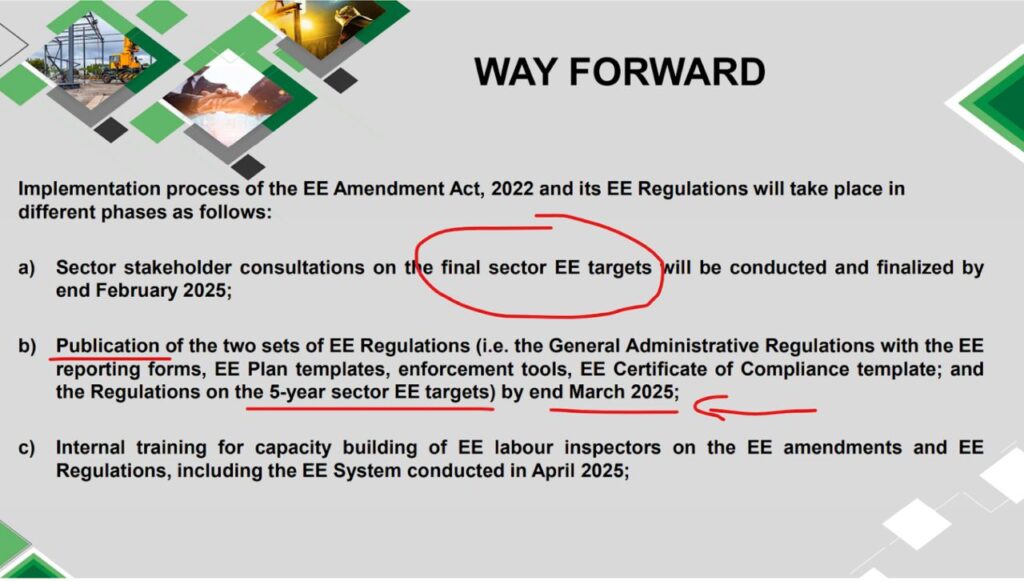![[WordPress Migration Data]
{
"source": "WordPress Migration",
"originalUrl": "https://www.sakeliga.org.za/wp-content/uploads/2025/02/Sakeliga-Employment-Equity-Act-copy.jpg",
"wpPath": "/wp-content/uploads/2025/02/Sakeliga-Employment-Equity-Act-copy.jpg",
"wpYear": "2025",
"wpMonth": "02",
"wpPostCount": 2,
"wpPostIds": [
75901,
75891
],
"migratedAt": "2025-09-18T13:59:13.066Z",
"migratedBy": "wp-media-to-contentful.mjs",
"fileSize": 363471
}
[End WordPress Migration Data]](https://images.ctfassets.net/ptr3cuja5dzu/01z67cy0ouu1rkWiwa6EFw/ec09eedbba4f5fcece6edd9a66ae25f3/Sakeliga-Employment-Equity-Act-copy.jpg?w=1920&h=1080&fit=fill&fm=webp&q=85)
Government plans to publish race quotas for employment by end March 2025
The South African Department of Labour plans to publish quotas for employment based on race, sex, and disability by the end of March 2025.
The racial and other hiring quotas are meant to apply to all employers, both business and not-for-profit, including international businesses operating in South Africa. The first round of quotas are supposedly to be met progressively within five years, after which they will be made even more stringent.
The March publication date was disclosed as part of a so-called consultation process run by the Department of Labour in January and February this year. The department intends to gradually start attempting sector-based enforcement thereafter.
The hiring quotas form part of the government’s attempt to implement new provisions in the Employment Equity Act as amended in 2023. This Act proposes to let the state force businesses – and all other employers – to hire strictly according to the government’s so-called “targets” for race, etc. Before the amendment, employers could generally find workarounds or define their own targets and were not strictly forced to hire according to government quotas. However, under the guise of “transformation”, the amended act now insists on stifling static arrangements that amount to absurd social engineering — that first, all economic activity and later, by implication, social activity, should be conducted strictly in specified racial and other demographic ratios.
The Act provides for several enforcement mechanisms, including banning non-compliant companies from doing business with the state. However, on paper, the state could even impose fines of up to 10% of turnover on supposedly “non-compliant” companies. (For specific stipulations in the Act, see below.)
The quotas are, for now, limited to companies with 50 or more employees, but this is no cause for comfort. For similar legislation in Namibia – a country that often mirrors the SA regulatory framework – the threshold was lowered to 10 employees late in 2022.
Unsurprisingly, the Act’s proposed racial profiling and social engineering is plainly illegal in many countries. Failure to comply is bound to be the norm for international investors and companies who not only resent being told who to employ but would otherwise face prosecution in their home countries for compliance.
Even within South Africa, the Act exposes employers to severe legal risk. In as far as they attempt to comply with the minister’s impossible and unlawful quotas, employers would necessarily have to personally classify people based on race, and decisively prejudice some employees in favour of others for no other reason than their race, sex, and disability status. By outsourcing such controversial liabilities to employers and enlisting them to implement this idiosyncratic political goal of transformationism, the minister and government seek to minimise their own legal and reputational risks around racial classification and discrimination.
Sakeliga’s opposition to the Act’s implementation since promulgation in 2023 has so far contributed to the abandonment of two previous drafts of the quota regulations. Should the government proceed with this third version, we intend to litigate both on substantive and procedural grounds.
As we craft our litigation, we invite businesses that expect to be unable to comply with the new quota system to provide us with more information by sending an email to help@sakeliga.org.za.
To the extent the government attempts implementation and enforcement, many business communities will have no other option but to avoid or defy such an impossible, harmful, and morally unacceptable Act. Businesses should prepare for maximum appropriate non-compliance with an irrational, harmful, and unconstitutional act for as long as it takes to have it scrapped or rendered practically impotent.
We recommend that businesses looking to make company-specific decisions obtain sound legal advice by considering joining an employers association with a strong track record in labour law, such as the National Employers’ Association of South Africa (NEASA).
Notable stipulations in the Act, on requirements and penalties:
- A designated employer must prepare and implement an employment equity plan which will achieve reasonable progress towards employment equity in that employer's workforce.
- The Minister may set numerical targets for any national economic sector
- The numerical goals set by an employer in their employment equity plans must comply with any sectoral target in terms of section 15A that applies to that employer.
- The Director-General may apply to the Labour Court to impose a fine in accordance with Schedule 1 if a designated employer fails to prepare or implement an employment equity plan in terms of this section.
- Fines for contravention of section 20, inter alia: the greater of between R1,500,000 and R2,700,000 or between 2% or 10% of the employer's turnover, depending on the extent of previous “contraventions”
Further reading:
- Sakeliga’s submissions on the Act and previous draft regulations.
- The Department’s slide deck for, in this case, financial and insurance businesses, with intended implementation timeline.


